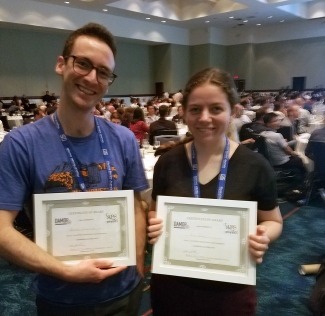JILA Graduate Students Julia Cline and William Cairncross swept the student poster awards at DAMOP 2018.
The Topical Group on Precision Measurement and Fundamental Constants (GPMFC) hosts a student poster competition at the annual meeting for Division for Atomic, Molecular & Optical Physics (DAMOP).
The competition has two categories: (1) Atomic Clocks and Sensors, and (2) Fundamental Constants, EDM’s and CP Violation. Students submitting DAMOP poster abstracts on precision measurements can participate in the GPFMC Student Poster competition. From submitted abstracts, four finalists are chosen in each category.
Julia Cline, a graduate student in the Thompson group, won the Atomic Clocks and Sensors category with her poster entitled, “Superradiant Lasing on the Millihertz Clock Transition”.
William Cairncross, a graudate student in the Cornell and Ye group, won the Fundamental Constants, EDM’s and CP Violation category with his poster entitled, “Towards an Order of Magntiude Improved Senstivitiy to the Electron’s EDM with Trapped HfF+”.
The winners in each category received a $500 cash prize and were recognized at the DAMOP 2018 banquet.
DAMOP was founded in 1943 as the first division of the American Physical Society. Its central focus is fundamental research on atoms, simple molecules, electrons and light, and their interactions. DAMOP 2018 was held from 28 May – 1 June in Ft. Lauderdale, FL.



 The Physics Frontiers Centers (PFC) program supports university-based centers and institutes where the collective efforts of a larger group of individuals can enable transformational advances in the most promising research areas. The program is designed to foster major breakthroughs at the intellectual frontiers of physics by providing needed resources such as combinations of talents, skills, disciplines, and/or specialized infrastructure, not usually available to individual investigators or small groups, in an environment in which the collective efforts of the larger group can be shown to be seminal to promoting significant progress in the science and the education of students. PFCs also include creative, substantive activities aimed at enhancing education, broadening participation of traditionally underrepresented groups, and outreach to the scientific community and general public.
The Physics Frontiers Centers (PFC) program supports university-based centers and institutes where the collective efforts of a larger group of individuals can enable transformational advances in the most promising research areas. The program is designed to foster major breakthroughs at the intellectual frontiers of physics by providing needed resources such as combinations of talents, skills, disciplines, and/or specialized infrastructure, not usually available to individual investigators or small groups, in an environment in which the collective efforts of the larger group can be shown to be seminal to promoting significant progress in the science and the education of students. PFCs also include creative, substantive activities aimed at enhancing education, broadening participation of traditionally underrepresented groups, and outreach to the scientific community and general public.